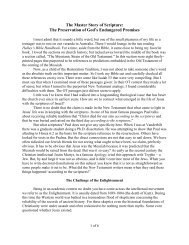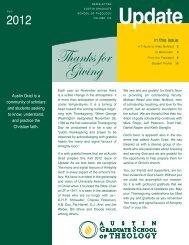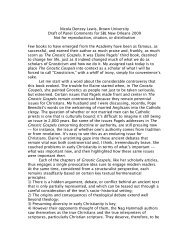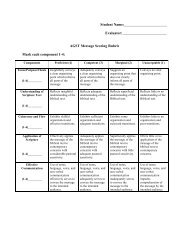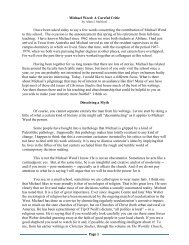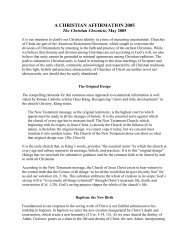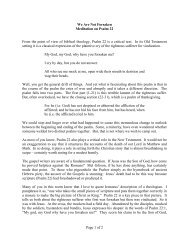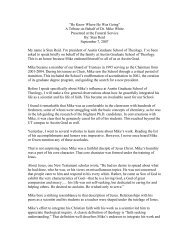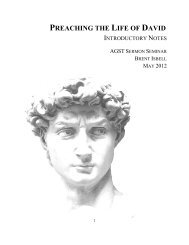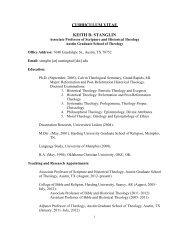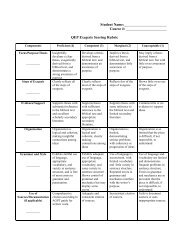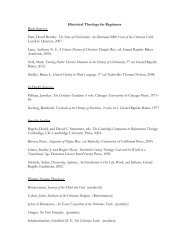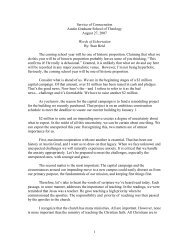You also want an ePaper? Increase the reach of your titles
YUMPU automatically turns print PDFs into web optimized ePapers that Google loves.
Who cannot be fascinated by such language? It has a wonderful capacity to draw us into its orbit.<br />
Inevitably we are forced to ask, “Where do I st<strong>and</strong> in this story?” This is <strong>the</strong> perspective I would<br />
like for you to cultivate with your congregation as you seek to lead <strong>the</strong>m on this search <strong>of</strong><br />
spiritual discovery. So let us now turn to <strong>the</strong> first <strong>of</strong> <strong>the</strong>se parables, <strong>the</strong> <strong>Tares</strong> among <strong>the</strong> <strong>Wheat</strong><br />
(13:24-30; 36-43).<br />
Locating <strong>the</strong> <strong>Parable</strong><br />
<strong>The</strong> <strong>Parable</strong> <strong>of</strong> <strong>the</strong> <strong>Tares</strong> (is it darnel, weeds, wild oats or whatever?) is a crucial part <strong>of</strong><br />
Mat<strong>the</strong>w’s famous parable unit in Mat<strong>the</strong>w 13. Aside from <strong>the</strong> <strong>Parable</strong> <strong>of</strong> <strong>the</strong> Sower which leads<br />
<strong>of</strong>f this collection <strong>of</strong> seven parables it is <strong>the</strong> only one given an extensive interpretive elaboration<br />
in this grouping. This parallel with <strong>the</strong> <strong>Parable</strong> <strong>of</strong> <strong>the</strong> Sower is important. It reminds us that <strong>the</strong><br />
<strong>Parable</strong> <strong>of</strong> <strong>the</strong> <strong>Tares</strong> must be read in <strong>the</strong> context <strong>of</strong> <strong>the</strong> entire parable chapter in Mat<strong>the</strong>w 13.<br />
My friend Lamar Cope points out that after Jesus narrates <strong>the</strong> <strong>Parable</strong> <strong>of</strong> <strong>the</strong> Sower in<br />
13:2-8 it is followed by a brief exhortation in 13:9:<br />
He who has ears (to hear) let him hear.<br />
Cope points out that this same wording occurs in 13:43 at <strong>the</strong> end <strong>of</strong> <strong>the</strong> parable <strong>of</strong> <strong>the</strong> <strong>Tares</strong>.<br />
Thus ano<strong>the</strong>r connection is made between <strong>the</strong> two parables. Mat<strong>the</strong>w’s point is that <strong>the</strong> parables<br />
are capable <strong>of</strong> being understood. <strong>The</strong> question <strong>of</strong> <strong>the</strong> disciples in 13:10 querying why <strong>the</strong>n does<br />
Jesus speak in parables (riddles) is, without doubt, an interesting request. It gets a direct answer<br />
in verses 10-17. Presuming <strong>the</strong> common process <strong>of</strong> exegesis in Jewish communities at that time,<br />
<strong>the</strong>se verses are saying that when <strong>the</strong> leader <strong>of</strong> <strong>the</strong> community unpacks a biblical text, instructed<br />
by <strong>the</strong> spirit, its deep secrets are made available by that teacher or his close followers. Although<br />
<strong>the</strong> text here is a parable <strong>and</strong> <strong>the</strong> teacher (Jesus) is unpacking its secrets (v. 11) it is <strong>the</strong>n<br />
interesting to note that <strong>the</strong> statement<br />
Who have eyes to see, but see not?<br />
Who have ears to hear, but hear not?<br />
is found in a biblical text: Ezek 13:2. <strong>The</strong>re <strong>the</strong> prophet is speaking against some in <strong>the</strong> house <strong>of</strong><br />
Israel: <strong>the</strong> community <strong>of</strong> faith. This will be pertinent as <strong>the</strong> <strong>Parable</strong> <strong>of</strong> <strong>the</strong> <strong>Tares</strong> unfolds. Israel<br />
has <strong>the</strong> capacity to hear, see <strong>and</strong> underst<strong>and</strong>. But as Isaiah says (Matt 13:14-15), those outside<br />
<strong>the</strong> core community <strong>of</strong> righteous ones are beset with confusion. Thus, only those in relationship<br />
with <strong>the</strong> teacher can fully underst<strong>and</strong>.<br />
With regard to <strong>the</strong> <strong>Parable</strong> <strong>of</strong> <strong>the</strong> Sower, <strong>the</strong> interpretation shows that it is really a parable<br />
about <strong>the</strong> outcome <strong>of</strong> <strong>the</strong> kingdom <strong>of</strong> <strong>the</strong> Son <strong>of</strong> Man. To <strong>the</strong> special few, <strong>the</strong> meaning <strong>of</strong> <strong>the</strong><br />
parable is clear. <strong>The</strong> seed is “<strong>the</strong> word <strong>of</strong> <strong>the</strong> kingdom.” Despite <strong>the</strong> different soils <strong>the</strong>re are only<br />
two kinds <strong>of</strong> people: those who hear <strong>and</strong> underst<strong>and</strong> (v. 23) <strong>and</strong> those who do not (vs. 19, 20,<br />
22). <strong>The</strong> critical point is that <strong>the</strong> parable anticipates <strong>the</strong> eschaton. As <strong>the</strong> later parables point out,<br />
4



